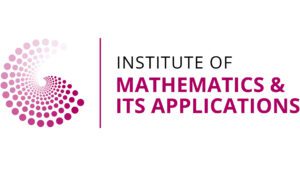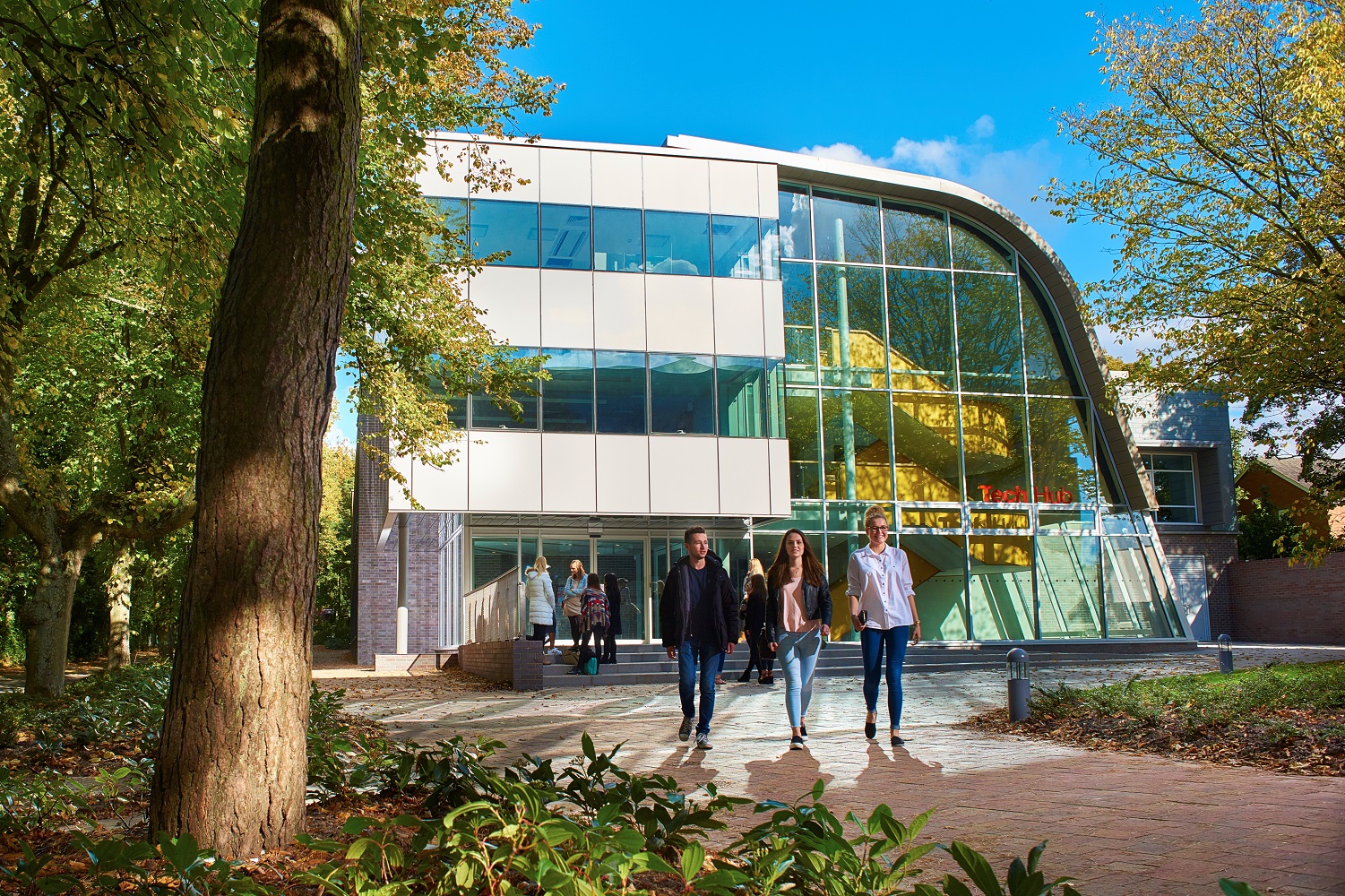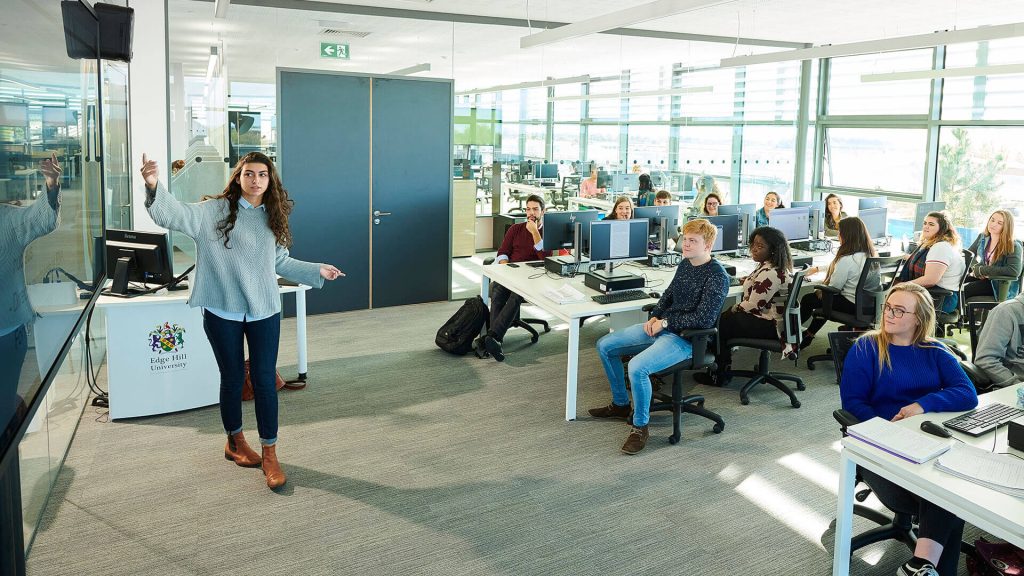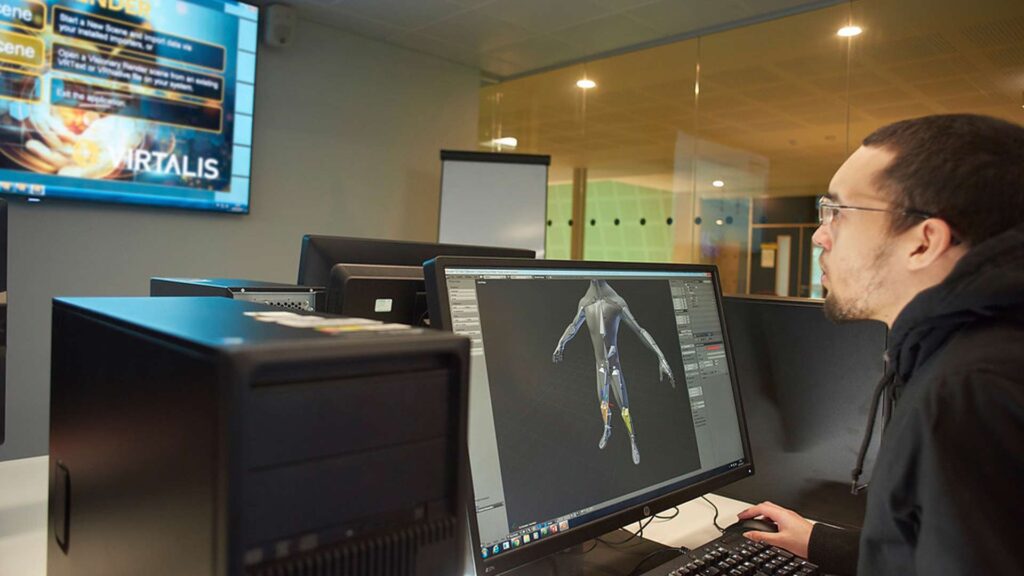Mathematics BSc (Hons)
UCAS code: G100
Enjoy problem solving, logical thinking and analytical skills? Deepen your understanding of mathematical concepts and their applications with our BSc (Hons) Mathematics degree.
Overview
| Course length: | 3 years full-time 6 years part-time |
|---|---|
| Start dates: | September 2025 September 2026 |
| Location: | Edge Hill University |
| Example offers: | BBC-BBB (A Level) or DMM (BTEC) |
| Subject(s): | Mathematics |
| Faculty: | Arts and Sciences |
| Department: | Computer Science |

Maths is a universal language with global recognition in industry and academic environments. Having a mathematics degree will open doors to many different careers and provides you with many different skills including analytical thinking, problem solving skills, critical reasoning, attention to detail, persistence, abstract thinking, curiosity, and logical structure.
Ignite your passion for mathematical exploration and its real-world applications. Through hands-on applications of maths, you’ll gain practical experience using software tools and data analysis techniques that are sought after in today’s data-driven world.
Develop a deep understanding of mathematical concepts and their significance in diverse fields. Study areas such as calculus, algebra, statistics, and discrete mathematics. You will cover advanced topics such as differential equations, and linear algebra, providing a robust foundation for both theoretical exploration and practical problem-solving.
This programme hones your attention to detail and accuracy. You will develop your communication skills, enabling you to articulate complex mathematical concepts with clarity and precision.
BSc (Hons) Mathematics will enhance your quantitative skills and critical reasoning abilities, regardless of your specific career goals. Grow your passion for mathematics and develop your intellectual, practical, and transferable skills which are essential for employment.
An accredited degree
This course will meet the educational requirements of the Chartered Mathematician designation, awarded by the Institute of Mathematics and its Applications, when it is followed by subsequent training and experience in employment to obtain equivalent competences to those specified by the Quality Assurance Agency (QAA) for taught masters degrees.
 Institute of Mathematics & ITS Applications
Institute of Mathematics & ITS Applications
Course features
-
International students can apply
-
Studying abroad option available
-
Sandwich year option available
-
Professional accreditation
What you'll study
In Year 1 of your maths undergraduate degree, you will delve into a wide array of essential calculus topics, covering core theorems such as the Mean-Value Theorem and the Fundamental Theorem of Calculus. We’ll cover a diverse range of topics that hold significant relevance in modern-day problem-solving, including applications in technologies like Google Maps and navigators. You will also study an employability-focused module, focusing on topics such as professional development, job-seeking skills, and effective communication.
On the second year of your degree, you will study four compulsory modules and be given the opportunity to select two out of four optional modules. You’ll build on your understanding of calculus and statistical analysis, while learning the fundamentals of number theory.
In Year 3, you’ll be given the opportunity to work on a research project and complete two compulsory modules as well as choose two out of four optional modules. The research project will be a unique project of your choice while the two compulsory modules include multivariable calculus and statistical modelling.
How you'll study
The delivery of your maths degree is based on a combination of lectures and tutorials. Lectures will cover the theoretical background of the subject matter, enabling you to gain a systematic understanding of the theoretical concepts outlined on each module. Tutorial sessions will be used to develop and reinforce your understanding of the theoretical methods and mathematical concepts covered in lectures, as well as develop your maths skills and knowledge of the topics covered on each module.
Lectures and tutorials will be delivered on campus. Corresponding lecture notes and supporting material will be made available on the Institutional Virtual Learning Environment (VLE), which will be accessible to you through the Web.
How you'll be assessed
Your assessments will take the form of assessed coursework, small group presentations, and class tests depending on each module.
You’ll also receive written and verbal feedback throughout your modules. This includes classroom discussions on key mathematical concepts introduced during the formal weekly lectures, and feedback on draft submissions of your assessed work. It is designed to promote your participation and engagement throughout the programme as well as facilitate an in-depth understanding of the summative assessment criteria. You will complete weekly exercises, partly in the weekly tutorial sessions and during your independent study. Feedback will be given on your work on these exercises to monitor your progress and provide early support, if needed.
Who will be teaching you
You will be taught by staff who are passionate about student learning and development, while also benefitting from guest lectures delivered by industry experts. The mathematics team are specialists in various branches of maths and computing and are active researchers. Their research feeds directly into the teaching of the programme, ensuring that you will learn about the latest developments within the subject while gaining the skills and knowledge required to meet industrial needs.
Where your course includes optional modules, these are to provide an element of choice within the course curriculum. The availability of optional modules may vary from year to year and will be subject to minimum student numbers being achieved. This means that the availability of specific optional modules cannot be guaranteed. Optional module selection may also be affected by timetabling requirements. Some restrictions on optional module choice or combinations of optional modules may apply.
Entry criteria
Typical offer 112-120 UCAS Tariff points. This must include A Level Mathematics at Grade B or above, or equivalent.
Example offers
| Qualification | Requirement |
|---|---|
| A Level | BBC-BBB. |
| UCAS Tariff points | 112-120 points. |
| BTEC Extended Diploma (or combination of BTEC QCF qualifications) | Distinction, Merit, Merit (DMM). |
| T Level | Overall grade of Merit. |
| International Baccalaureate (IB) | We are happy to accept IB qualifications which achieve the required number of UCAS Tariff points. Subject-specific requirements at Higher Level (HL) Grade 5 may apply. |
| Access to Higher Education Diploma | 45 credits at Level 3, for example 15 credits at Distinction and 30 credits at Merit or 24 credits at Distinction and 21 credits at Merit. The required total can be attained from various credit combinations. |
Please note, the above examples may differ from actual offers made. A combination of A Level and BTEC awards may also be accepted.
If you have a minimum of two A Levels (or equivalent), there is no maximum number of qualifications that we will accept UCAS points from. This includes additional qualifications such as Extended Project Qualification (EPQ), AS Levels that haven't been continued to A Level, and General Studies AS or A Level awards.
English language requirements
International students require IELTS 6.0, with a score no lower than 5.5 in each individual component, or an equivalent English language qualification.
If your current level of English is half a band, one band, or one-and-a-half bands lower, either overall or in one or two elements, you may want to consider our Pre-Sessional English course.
Fair Entry Criteria
Our new Fair Entry Criteria is a Contextual Admissions Policy that takes an applicant’s personal and educational background into account. This policy will allow eligible applicants to receive up to a two-grade reduction in their entry requirements for this course. Find out more and see if you qualify.
How to apply
Apply full-time
Read our guide to applying through UCAS to find out more about the application process.
International
Please see our international student pages for further information about how to apply as a prospective international student.
Part-time applications require a direct application to Edge Hill. Please select the year of entry that you wish to apply for.
Should you accept an offer of a place to study with us and formally enrol as a student, you will be subject to the provisions of the regulations, rules, codes, conditions and policies which apply to our students. These are available at www.edgehill.ac.uk/studentterms.
If you join a full time undergraduate degree at Edge Hill University, we will guarantee you the offer of a room in our halls of residence for the first year of your course.
Discover our accommodation
Facilities
Mathematics is based in the state-of-the-art £13m Tech Hub. This purpose-built development offers outstanding contemporary facilities including our Harvard style lecture theatre. With specialist modern  laboratories containing comprehensive test and measurement equipment, you’ll find high-specification computers, high-resolution screens and the latest hardware and software.
laboratories containing comprehensive test and measurement equipment, you’ll find high-specification computers, high-resolution screens and the latest hardware and software.
As a mathematics student you will have access to a variety of mathematics software to support your learning, including Microsoft EXCEL, SPSS software, Autograph and Microsoft Mathematics. Graphics Calculators will also be available to loan from the Catalyst building, home to our library and learning spaces that’s open 24/7 in term-time.
Where you'll study
Finance
Tuition fees
UK Full-Time
£9,535
a year
UK Part-Time
£79 per credit
for 360 credits
International
£17,000
a year
EU/EEA and Swiss students who have settled or pre-settled status under the EU Settlement Scheme, as well as Irish nationals, may be eligible for the UK tuition fee rate.
Financial support
Subject to eligibility, UK students joining this course can apply for a Tuition Fee Loan from the Government to cover the full cost of tuition fees. UK students enrolling on the course may also be eligible to apply for additional funding to help with living costs.
Scholarships
We offer a range of scholarships, which celebrate the determination, commitment and achievement of our students. Many of our scholarships are awarded automatically. There are some however, where you will need to be involved in an application or nomination process. To find out more about our scholarships and check your eligibility, please visit our dedicated scholarships pages.
Money Matters
Please view the relevant Money Matters guide for comprehensive information about the financial support available to eligible UK students.
EU/EEA and Swiss students who have settled or pre-settled status under the EU Settlement Scheme may be eligible to apply for financial support. Irish nationals can ordinarily apply to Student Universal Support Ireland (SUSI). If you are an EU student who does not have settled or pre-settled status, or are an international student from a non-EU country, please see our international student finance pages.
Your future career
Graduating with a maths degree will ensure you have a versatile skill set that enhances your employability. BSc (Hons) Mathematics opens doors to a range of career opportunities and provides you with the tools to excel in a wide range of careers. Many maths graduates pursue careers in fields such as science, engineering, finance, data analysis, teaching and various other areas where a solid foundation in mathematics holds utmost importance.
Careers in maths offer competitive salaries due to the specialised nature of the skills acquired. The types of roles available to a graduate with a BSc Mathematics include:
- Statistician and mathematical modeller
- Actuary operational researcher
- Management consultant
- Data analyst
- Computer scientist
- Commodity trading adviser
- Teacher of mathematics, following a one year PGCE course
Course changes
Every effort has been made to ensure the accuracy of this information, however our courses are subject to ongoing review and development. Changing circumstances may necessitate alteration to, or the cancellation of, courses.
Changes may be necessary to comply with the requirements of professional bodies, revisions to subject benchmarks statements, to keep courses updated and contemporary, or as a result of student feedback. We reserve the right to make variations if we consider such action to be necessary or in the best interests of students.









